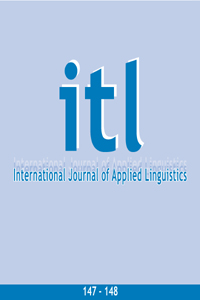 previous article in this issue previous article in this issue | next article in this issue  |

|
Document Details : Title: The Effect of Direct and Indirect Corrective Feedback on L2 Learner's Written Accuracy Author(s): VAN BEUNINGEN, C.G. , DE JONG, N.H. , KUIKEN, F. Journal: ITL - International Journal of Applied Linguistics Volume: 156 Date: 2008 Pages: 279-296 DOI: 10.2143/ITL.156.0.2034439 Abstract : Among scholars there is disagreement on the benefits of corrective feedback on second language learners’ written output. While some researchers advocate the usefulness of corrective feedback, Truscott claims that all error correction is unnecessary, ineffective, and even harmful, in that it diverts time and energy away from more productive aspects of writing instruction. Until now, research outcomes cannot settle this debate since only short-term effectiveness of corrective feedback could be demonstrated. Due to methodological shortcomings, results from studies that investigated long-term effects of error correction on accuracy improvement are inconclusive. By trying to overcome some of these design related drawbacks (i.e. the lack of a proper control group and time-on task differences between treatment groups), the present study intends to make a contribution to the ongoing error correction debate. The effectiveness of direct and indirect corrective feedback was compared to the effect of two control treatments: a treatment that offered students an extra opportunity to practice their writing skills, and a treatment in which students self-corrected their errors without any available feedback. Results show that corrective feedback can be effective in improving students’ accuracy: while short-term effects were found for both direct and indirect corrective feedback, only direct feedback proved to have a significant long-term effect. Neither of the control treatments had a significant effect on students’ accuracy. |
